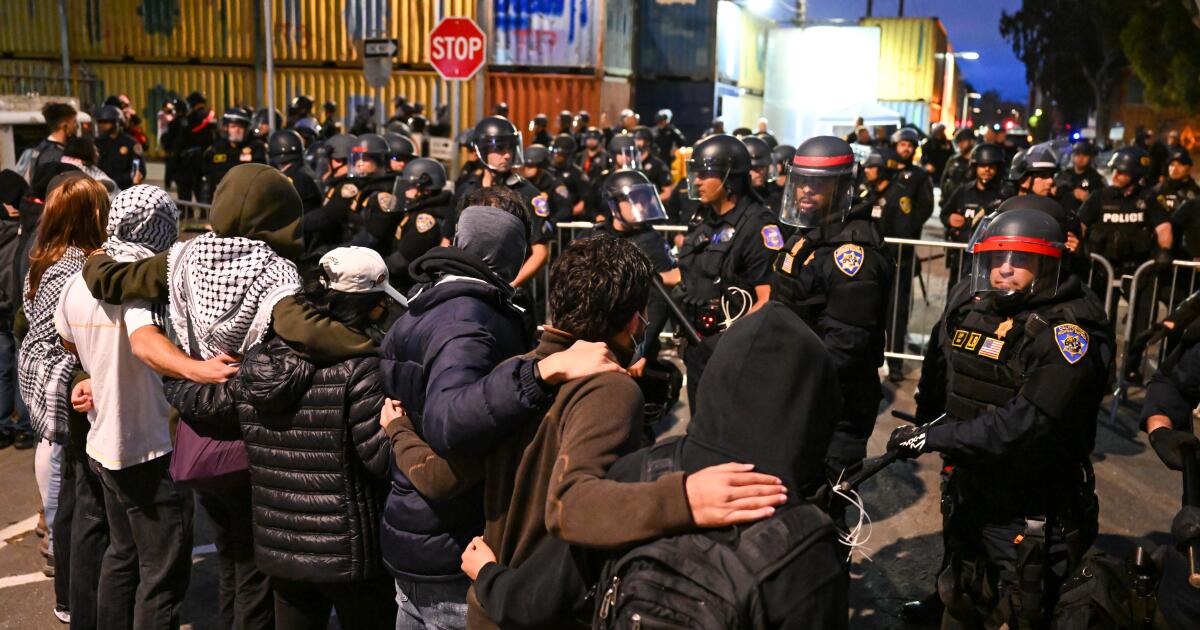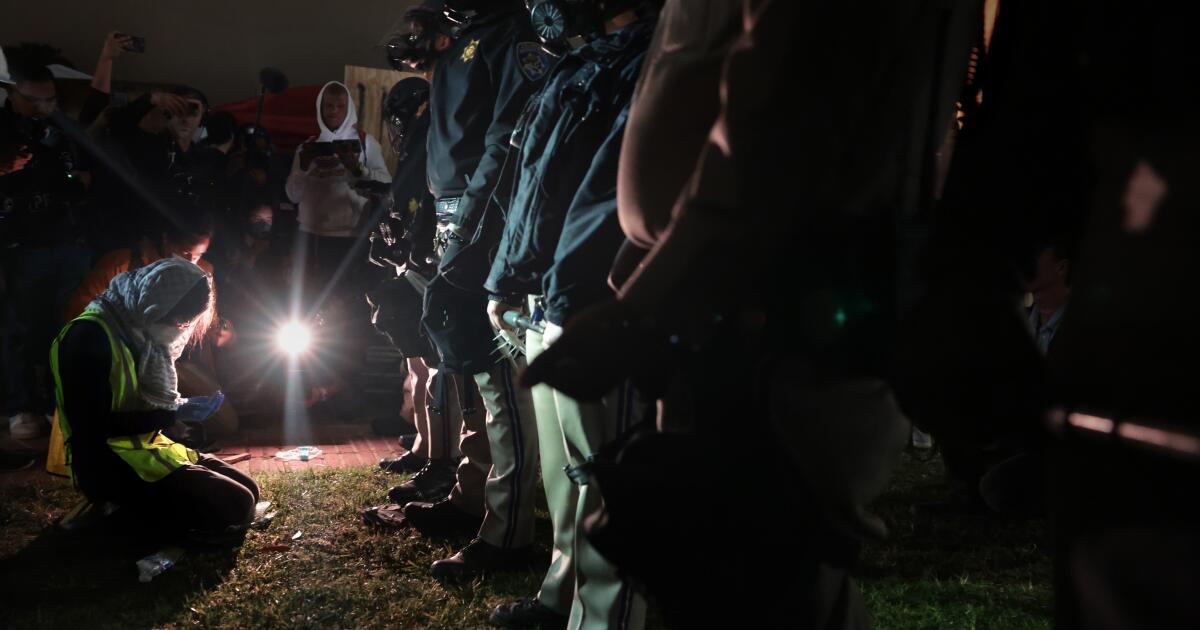World News
Grad ceremony nixed, USC holds alternative party. Feelings are mixed

No valedictorian speech. No celebrity speakers. No main-stage ceremony, and no massive graduate walk to “Pomp and Circumstance” before tens of thousands of guests.
Instead, USC’s graduating seniors — whose traditional main graduation ceremony was canceled — were thrown an alternative party Thursday night: a “Trojan Family Graduate Celebration” at Los Angeles Memorial Coliseum on the eve of smaller campus commencement ceremonies where diplomas were set to be awarded at individual school events.
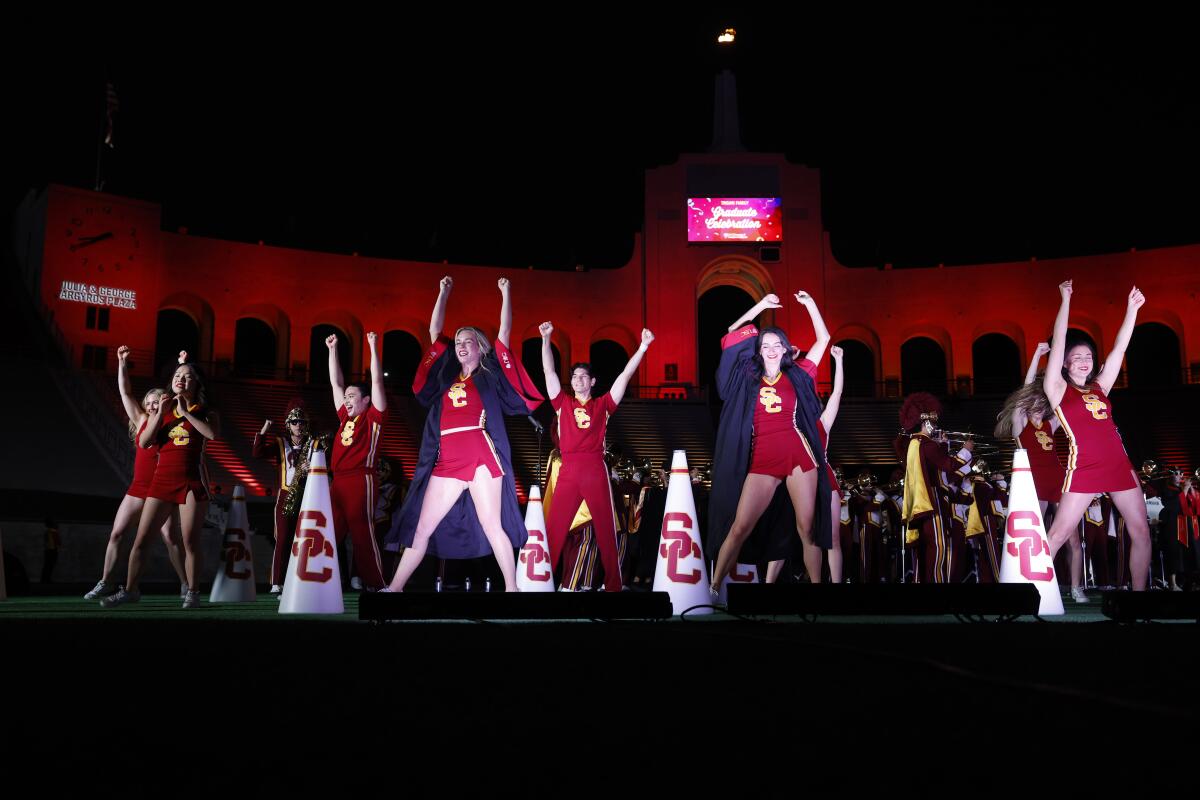
The USC cheerleaders perform at the Coliseum on Thursday.
(Gina Ferazzi / Los Angeles Times)
The Thursday night event was billed as an “electric atmosphere” — capped at six tickets per grad — featuring a drone show, fireworks and a “special gift” for the Class of 2024: a hat from rap star Travis Scott’s collegiate clothing brand.
The university had pitched the event as a “Southern California-style” celebration to compensate for the loss of the main-stage ceremony with a valedictorian, keynote speeches and the presentation of honorary degrees. But turmoil and campus protests over the Israel-Hamas war upended that ritual.
Thia Broido, a graduating senior who sat on a top row at the Coliseum with her parents and brother Thursday night, said she was saddened by the controversial cancellation of the main commencement.
Her high school commencement was upended by the start of the COVID-19 pandemic, with the graduation stage replaced by a “super cute” drive-in ceremony and social distancing, she said.
For her college graduation, she was glad to have the family-friendly event at the Coliseum, but she said it didn’t “remove anything that has happened” over the last few weeks.
“I don’t want to be a downer about it,” Broido said. “I’m happy for what we have. But what USC is doing is ongoing, and I can’t forget about that.”

Thursday night’s event included a drone show.
(Gina Ferazzi / Los Angeles Times)
Citing unspecified safety threats, USC President Carol Folt last month rescinded pro-Palestinian valedictorian Asna Tabassum’s speaking slot and then canceled the main ceremony. After students set up a pro-Palestinian tent encampment and demanded that USC end its financial ties with Israel, Folt and her team called in the Los Angeles Police Department, and 93 people were arrested. On Sunday morning, police cleared a second encampment, but no arrests were made.
On Wednesday, Folt and Provost Andrew Guzman were censured by the Academic Senate, a body of representatives for USC faculty. The members cited “widespread dissatisfaction and concern among the faculty about administrative actions and decisions surrounding protests and commencement.”
Folt has defended her actions, and said in an interview with The Times that campus safety is her “North Star.”
“For me, I have a very clear North Star: that I am the person at the university, no matter how complicated the issue and how much I empathize with everybody involved — which has been true for me — I still in the end have to sit back and say, ‘What can I do to keep my campus and my people as safe as possible?’ ”
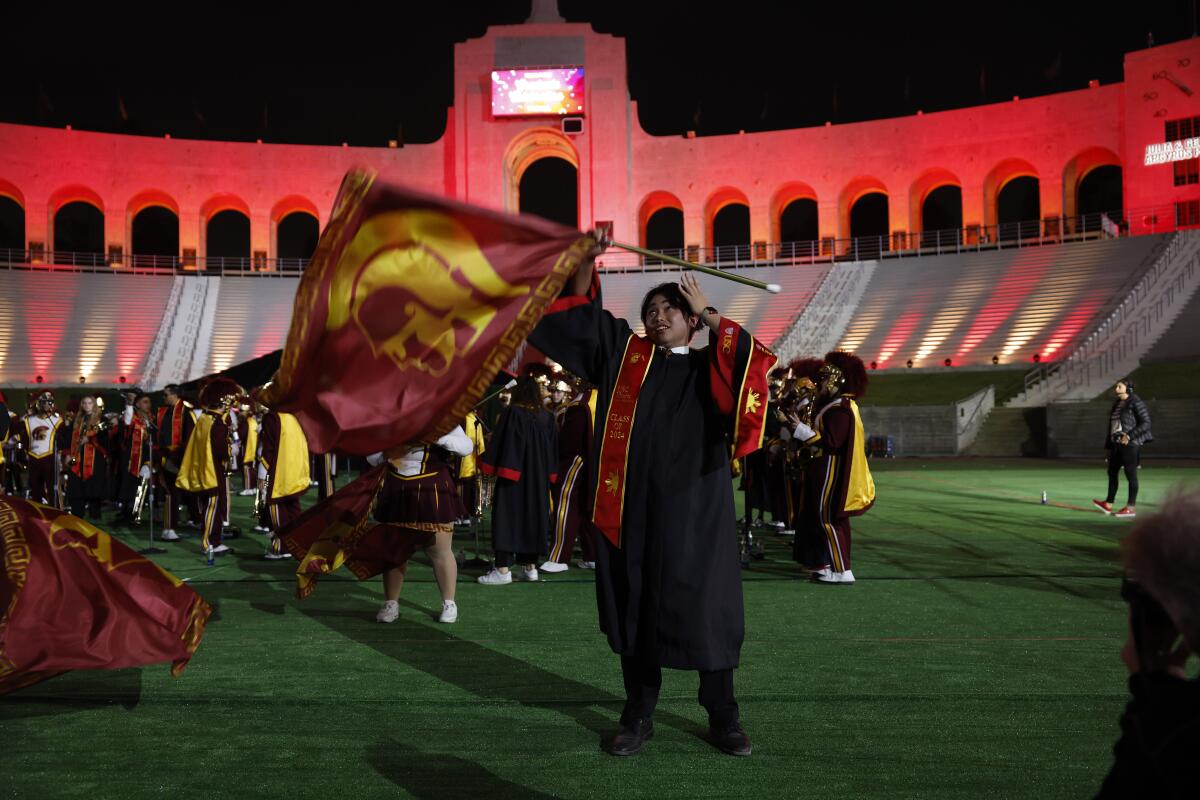
Among the entertainment was the Trojan marching band.
(Gina Ferazzi / Los Angeles Times)
Typically, the annual Baccalaureate Ceremony — a nondenominational, interfaith celebration — is held on the eve of graduation at Bovard Auditorium in the center of campus. This year, there was an “in-person blessing” for the Coliseum bash, as well as an “online interfaith blessing” that could be viewed on a commencement website.
During the Student Recognition Awards Ceremony on Thursday afternoon, students clad in graduation gowns cheered at length when Tabassum was recognized. She laughed and pretended to check her watch as the applause continued.
“You may not know this,” the announcer joked, “but Asna is USC’s 2024 valedictorian.”
Her classmates then gave her a standing ovation.
Security at the Coliseum leading up to commencement has been tight.
On Thursday, access to USC’s campus, which was already restricted to the university’s students, faculty, staff and registered guests, became even stricter. Students and staff had to show USC identification, and anyone else trying to access campus needed a commencement ticket.
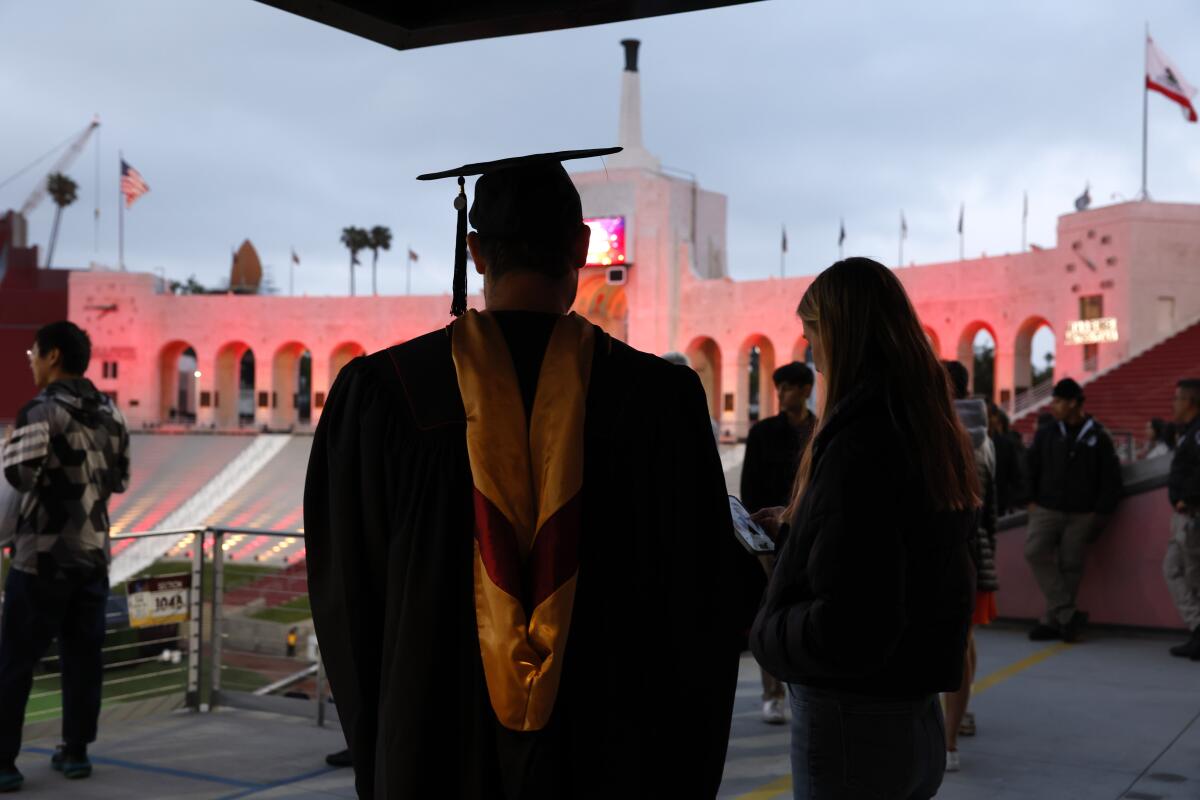
Grads gather before the event at the Coliseum on Thursday.
(Gina Ferazzi / Los Angeles Times)
Metal fences and black gates were posted around campus. Guests walked through metal detectors and were asked to carry clear purses or bags. Since the Sunday encampment sweep, officers from several law enforcement agencies have been stationed at the center of the USC campus.
They included officers from the Baldwin Park Police Department, La Habra Police Department, Los Angeles Police Department and Los Angeles Airport Police, according to David Carlisle, assistant chief of the university’s Department of Public Safety.
Officers were stationed near the Tommy Trojan statue, which had been cleaned after a protester — who organizers of the student encampment said was not affiliated with them — spray-painted “Stop Genocide” on its plaque.
No demonstrations disrupted Thursday night’s event, although speakers and attendees acknowledged the tense campus climate.
Inside the Coliseum, deejay duo Phantogram took the stage at 7:45 p.m. for a set before a sparse crowd of about 350. But attendance had grown substantially by the time the event began about 45 minutes later.
A campus spokesperson said more than 22,000 people attended.
Broido, the graduating senior, said she thought it was odd that the university would give out the Travis Scott hats — black caps with the words “USC Alumni” — which were distributed at a tent. She said she stopped being a fan of the rapper after 10 people were killed in a crowd crush at the 2021 Astroworld music festival in Houston.
“I think it’s ironic that USC would partner with him,” Broido said. “I like his music — it’s just mixed feelings.”
Varun Soni, dean of religious life at the university, delivered the invocation — a tradition typically held during the main-stage commencement.
“There are so many in our community who are wrestling with anger and grief,” he said.
The world, he said, is gripped by “five major crises” — war, justice, health, sustainability and joy.
“We have a full-blown crisis of joy,” he said.
The evening’s event, he said, was about celebrating the graduates and giving joy when it is needed the most.
A series of video messages were projected on a large screen, including remarks by late-night host Jimmy Kimmel.
“This class,” he said, “has been through a lot. More than other classes have had to deal with.”
When the event concluded, the words “Class of 2024” and “Fight On!” were spelled in the sky by drones with red and white lights.
Jack Callahan, who was decked out in USC gear, flew out with his family from Buffalo, N.Y., to watch his daughter Kiera graduate. Callahan was glad the university hosted a “big event to celebrate the graduates” after the family was initially disappointed to learn about the main-stage commencement’s cancellation.
“I loved the camaraderie, the spirit and the drone show,” Callahan said. His wife, Liza, was equally thrilled with the drones, which she called “absolutely amazing.”
“When we graduated,” she said, “there was nothing like that. Technology has come so far.”
But Kiera, who studied psychology, would have preferred the real graduation.
“I thought it was cute,” she said. “It was nice that they did something. But it doesn’t replace commencement.”
Times photographer Gina Ferazzi contributed to this report.
World News
Why All Married People Need a Post-Nuptial Agreement

Marriage is usually talked about in terms of love and relationships—the intensity of emotion you feel toward one another, and the safety and security of finding your Person and knowing you’ll spend the rest of your life with them.
Except, of course, that the time spent married is typically less than a decade—most marriages in the U.S. end after about seven years. Most marriages end in divorce—about half of all first marriages wind up in divorce court, and that rate skyrockets with second (67%) and third (73%) marriages.
That’s why it’s important to remember that marriage is a legally binding contract as much as it is a symbolic joining of two souls. Viewed like that, stuff like pre-nuptial agreements don’t seem so cold and brutal; they can be a godsend if your marriage is one of those that don’t make it. If you’ve already gotten married, it’s not too late to get rational about your partnership and enshrine your mutual understanding in writing, though. You can always draw up a post-nuptial agreement.
Post-nuptial agreements
A post-nuptial agreement is exactly what it sounds like: a legal agreement between spouses that you create and sign after you’re already married. You might enter into one because you didn’t create a pre-nuptial agreement and want to clarify things, or your financial situation has changed and now you feel the need to formalize some understandings. The crucial difference is the focus of the document: A pre-nup is mostly focused on you as an individual, with no implied obligation to your spouse—it protects the assets you already had before the marriage. A post-nup explicitly deals with your obligation to your spouse.
Post-nuptial agreements typically outline a few common aspects of your legal and financial responsibilities to each other:
-
Inventory and division of assets. A post-nup will typically clearly state who owns what, and how the assets will be divided in the case of divorce. This can range from property like a home to investments to a family-owned business. For example, if the couple has a shared investment portfolio but one spouse contributes 75% of the money invested in it, the post-nup could specify that the funds will be split 75-25 in case of divorce, which can spare you a lot of squabbling.
-
Allocation of debts and other obligations. A post-nup can also clearly define who will be responsible for debts that are currently shared within the marriage. If you took out a large loan, for example, or have a car payment or mortgage, the post-nup defines who carries that debt if the marriage is dissolved.
-
Alimony and support. A post-nup can also define future financial arrangements, like spousal support. For example, if one spouse stops working in order to care for children and take care of the home, the post-nup could define the earnings they sacrificed and require the other spouse to pay support. This can make a partner feel more secure in their choice to give up a career.
A post-nuptial agreement can also contain provisions for future property and financial windfalls. For example, it can specify that any property acquired by either partner after signing the post-nup will be considered their individual asset and not a shared one. You can also define how inheritances will be handled, or how large gifts will be handled. For example, if one spouse’s parents gave the couple a large monetary gift in order to purchase a house, the post-nup can define whether the other spouse should repay their share of that gift or if it should be forgiven and considered moot.
One thing you can’t put in a post-nuptial agreement is custody arrangements. Even if both partners agree on plans for children in the case of divorce, the actual decisions surrounding custody and support are almost always reserved for the court to decide based on the best interests of the child. Even if you try to codify custody and support in your post-nup, it won’t be enforceable unless a court agrees with you on every point.
How to create a post-nuptial agreement
Post-nuptial agreements can be a murky area of the law, depending on where you live. Some states have clear legal guidelines for them; other states have very little precedent. Your best bet is always to engage the services of an experienced family lawyer when crafting one to ensure it will be enforceable in your state.
Generally speaking, however, as long as the agreement satisfies some basic principles you’ll be fine. The agreemnet should be:
-
In writing. The agreement has to be in writing—an “understanding” or oral contract, even if affirmed by both parties, is usually not going to cut it. And both parties must sign the agreement in a legally acceptable way.
-
Voluntary and just. Neither partner can be pressured or compelled into signing the post-nuptial agreement. For example, if one partner threatens to leave the other penniless unless they sign an agreement that strongly favors them, that agreement is most likely unenforceable.
Similarly, the terms of the agreement must usually also be reasonable and fair. Even if both sides agree, if the courts find any provisions to be unconscionable or unjust the agreement may be rejected.
-
Comprehensive. Post-nuptial agreements have to fully disclose all relevant information. Hiding assets or other information can render the whole agreement unenforceable.
Like pre-nuptial agreements, post-nups don’t only apply to troubled marriages. These agreements can create a sense of security for both partners by providing clear guidelines, an inventory of assets, and other ground rules for the marriage. Plus, since these agreements remove much of the financial uncertainty surrounding divorce, they can also help couples focus more on the emotional bonds between them and the relationship, because they don’t have to worry about maneuvering financially to protect themselves.
World News
Julian Assange trial in London could decide whether the WikiLeaks founder is extradited to the US

- WikiLeaks founder Julian Assange faces a court hearing in London that could end with him being sent to the U.S. to face espionage charges, or provide him with another chance to appeal his extradition.
- The U.S. has assured judges that Assange’s rights would be protected and that he would not face the death penalty in the event of extradition, but Assange’s legal team argues they are not good enough to rely on.
- Assange was indicted on 17 espionage charges and one charge of computer misuse over his website’s publication of classified U.S. documents almost 15 years ago.
Julian Assange faced a key hearing Monday in the High Court in London that could end with him being sent to the U.S. to face espionage charges, or could provide him another chance to appeal his extradition.
The WikiLeaks founder, who has spent the past five years in a British prison, was not in court to hear his fate being debated. He did not attend for health reasons, his lawyer Edward Fitzgerald said.
The outcome of the hearing will depend on how much weight judges give to assurances U.S. officials have provided that Assange’s rights won’t be trampled if he goes on trial.
In March, two judges rejected the bulk of Assange’s arguments but said he could take his case to the Court of Appeal unless the U.S. guaranteed he would not face the death penalty if extradited and would have the same free speech protections as a U.S. citizen.
The court said that if Assange, who is an Australian citizen, couldn’t rely on the First Amendment then it was arguable his extradition would be incompatible with the European Convention on Human Rights, which also provides free speech and media protections.
The U.S. has provided those reassurances, though Assange’s legal team and supporters argue they are not good enough to rely on to send him to the U.S. federal court system.
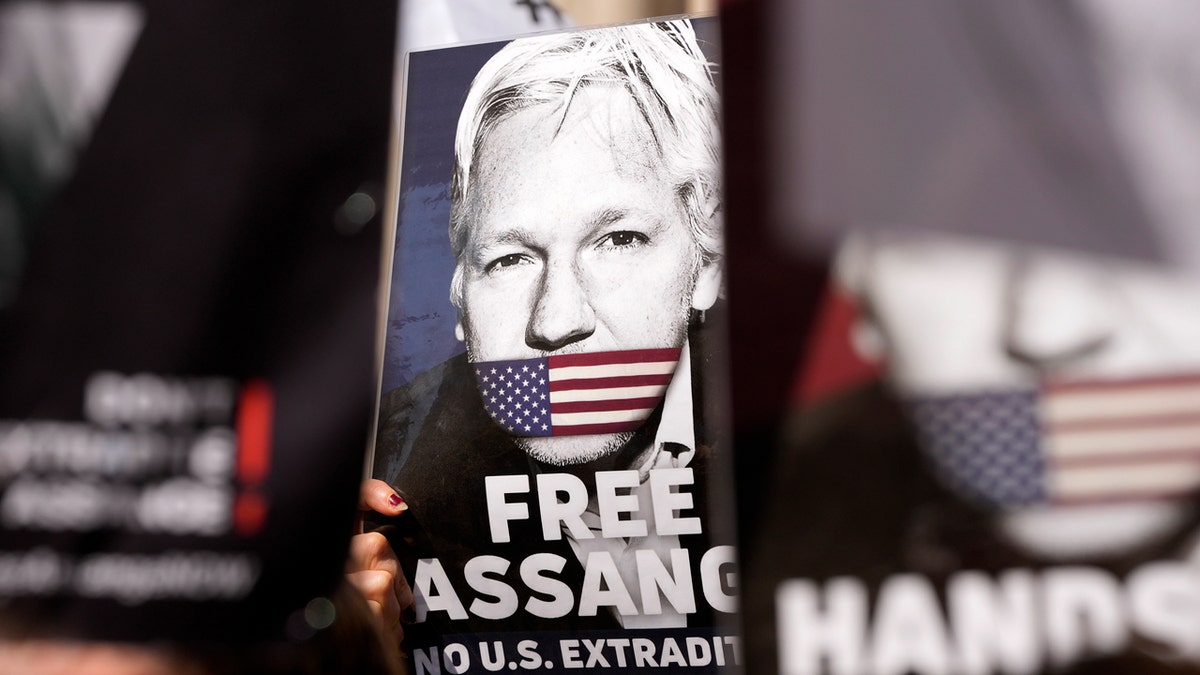
Protesters hold placards outside the High Court in London on May 20, 2024. WikiLeaks founder Julian Assange faces a hearing Monday in the High Court in London that could end with him being sent to the U.S. to face espionage charges, or provide him with another chance to appeal his extradition. (AP Photo/Kin Cheung)
The U.S. said Assange could seek to rely on the rights and protections of the First Amendment but that a decision on that would ultimately be up to a judge. In the past, the U.S. said it would argue at trial that Assange is not entitled to the constitutional protection because he is not a U.S. citizen.
“The U.S. has limited itself to blatant weasel words claiming that Julian can ‘seek to raise’ the First Amendment if extradited,” his wife, Stella Assange, said. “The diplomatic note does nothing to relieve our family’s extreme distress about his future — his grim expectation of spending the rest of his life in isolation in U.S. prison for publishing award-winning journalism.”
Assange, 52, has been indicted on 17 espionage charges and one charge of computer misuse over his website’s publication of a trove of classified U.S. documents almost 15 years ago. American prosecutors allege that Assange encouraged and helped U.S. Army intelligence analyst Chelsea Manning to steal diplomatic cables and military files that WikiLeaks published.
Commuters emerging from a Tube stop near the courthouse couldn’t miss a large sign bearing Assange’s photo and the words, “Publishing is not a crime. War crimes are.” Scores of supporters gathered outside the neo-Gothic Royal Courts of Justice chanting “Free Julian Assange” and “Press freedom, Assange freedom.”
Some held a large white banner aimed at President Joe Biden, exhorting: “Let him go Joe.”
Assange’s lawyers say he could face up to 175 years in prison if convicted, though American authorities have said any sentence would likely be much shorter.
Assange’s family and supporters say his physical and mental health have suffered during more than a decade of legal battles, which includes seven years spent inside the Ecuadorian Embassy in London from 2012 until 2019. He has spent the past five years in a British high-security prison.
Assange’s lawyers argued in February that he was a journalist who exposed U.S. military wrongdoing in Iraq and Afghanistan. Sending him to the U.S., they said, would expose him to a politically motivated prosecution and risk a “flagrant denial of justice.”
The U.S. government says Assange’s actions went way beyond those of a journalist gathering information, amounting to an attempt to solicit, steal and indiscriminately publish classified government documents.
If Assange prevails Monday, it would set the stage for an appeal process likely to extend what has already been a long legal saga.
If the court accepts the word of the U.S., it would mark the end of Assange’s legal challenges in the U.K., though it’s unclear what would immediately follow.
His legal team is prepared to ask the European Court of Human Rights to intervene. But his supporters fear Assange could be transferred before the court in Strasbourg, France, could halt his removal.
Judges Victoria Sharp and Jeremy Johnson may also postpone issuing a decision.
CLICK HERE TO GET THE FOX NEWS APP
If Assange loses in court, he still may have another shot at freedom.
Biden said last month that he was considering a request from Australia to drop the case and let Assange return to his home country.
Officials provided no other details but Stella Assange said it was “a good sign” and Australian Prime Minister Anthony Albanese said the comment was encouraging.
World News
Iran’s President Dies in Crash, and Trump Trial Enters Final Days

Plus, Baltimore bridge ship to be moved.
Source link
-

 African History4 months ago
African History4 months agoBlack History Facts I had to Learn on My Own pt.6 📜
-

 African History4 years ago
African History4 years agoA Closer Look: Afro-Mexicans 🇲🇽
-

 African History1 year ago
African History1 year agoPROOF AFRICAN AMERICANS AIN'T FROM AFRICA DOCUMENTED EVIDENCE
-

 African History2 years ago
African History2 years agoHow Did Normal Medieval People Survive Winter? | Tudor Monastery Farm | Chronicle
-

 African History4 years ago
African History4 years agoA Closer Look: Afro-Mexicans 🇲🇽
-

 African History3 years ago
African History3 years agoWhat happened to the many African Kingdoms? History of Africa 1500-1800 Documentary 1/6
-

 African History3 years ago
African History3 years agoThe Entire History of Africa in Under 10 Minutes – Documentary
-

 African History2 years ago
African History2 years agoAFRO MEXICO: Black History In Mexico!



